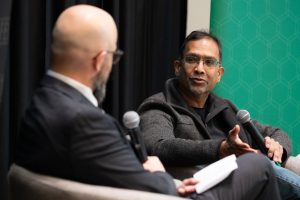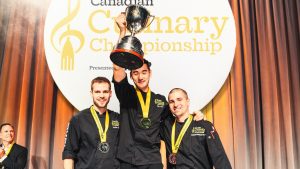William Jones walked into the CHEO Bears’ Den event with his mother in mind.
The CEO and co-founder of Leynek Medical was the day’s winner for his pitch for ReneCare, an app that aims to reduce paperwork and increase communication between cancer patients, their medical team and their loved ones.
Jones said the idea for ReneCare came from living through his mother’s fight with cancer in Niagara Falls while he was living in Ottawa. He says the distance between them made him feel there was a disconnect between patients, caregivers and health-care workers.
(Sponsored)

Desjardins Elevator Pitch Competition drives entrepreneurial energy at uOttawa
In uOttawa’s Desjardins Elevator Pitch Competition, a single team member stands before the judges, pitching for three minutes, fielding questions for five. There are no decks, notes, props or prototypes

For the fifth year in a row, Ottawa will become the epicentre of Canadian culinary excellence in late January. Chefs from Ottawa, Vancouver, Edmonton, Calgary, Saskatoon, Winnipeg, Toronto, Montreal, Moncton
“Seeing how my brothers and my aunts had different perspectives of how she was progressing through that journey, I just thought there’s got to be a better way to improve the way that caregivers communicate,” Jones said.
Jones was one of four entrepreneurs who pitched their companies to the judges at CHEO’s Bears’ Den event last week in hopes of winning the grand prize to support the launch of their technology.
The Bears’ Den is the CHEO Research Institute’s pitch event for health-care startups, similar to the CBC’s Dragons’ Den. This year was the second edition of the event, which hopes to find companies that will help advance innovation in the health-care industry and advance pediatric care in the city.
Each startup was given seven minutes to make a pitch to the three judges and answer their questions.
The company that won the “fan favourite” prize, voted by people in the room, was AIHearu, an AI-powered system that learns the vocal patterns of those with speech impairments to reproduce their intended words so that they may be better understood.
The two other companies were miRoncol, a blood test that can identify types of cancers based on miRNA and polymerase chain reaction technology; and Dicerra, a safety-reporting system that aims to reduce the amount of fatal medical errors based on similar systems in the aviation industry.
The panel of judges, or “bears,” consisted of Suzanne Grant, executive director of the Capital Angel Network; Marie-Ange Janvier, clinical engineer at CHEO and professor at the University of Ottawa and Carleton University; and Blake Farquharson, assistant vice-president of RBCx.

Jones says the $25,000 prize, provided by the Core Innovation program, the CHEO Foundation, MNP and Dentons, will help in continuing to form the app and get it out to who might need it most.
“In Canada, it can be tough at times to raise money, especially in the earlier stages of a company’s formation. Programs like this are phenomenal … any winning that comes from it is very beneficial for us to go apply, in a commercial sense, to get adoption (of the product) out there,” Jones said.
Jones said next steps include continuing conversations with hospitals and community clinics, as well as continuing to innovate the app itself.
“(We’re looking to) get adoption at sites, whether it’s through research, which we have a few places in mind that we’re already working with, or commercial adoption, which we’re already talking to a few groups as well,” Jones said.
Speaking with OBJ before the winner was announced, Grant says the bears were looking for a startup that had the best shot at commercialization.
“There’s usually a framework that comes with the competition, but I believe this group is looking for those companies that have got a shot towards commercialization, to being viable. The four companies on stage today are great, solid companies and their visibility and network that grows here is really what it’s all about,” she said.
Janvier emphasized that adaptability of the technology for hospitals is also key.
“Can we see that technology five years down the road, 10 years down the road? Can we see the concretization of this technology being applicable and used by clinicians, patients and users?” Janvier said.
Matthew Bromwich, director of CHEO’s Core Innovation program, says events like these help showcase the talent Canada has to offer.
“The challenge is that, in Canada, we all export medical technology at low value and then buy it back at high value from the United States. We do it with a lot of things … and it’s time we stop doing that, because we’d like to keep high-value jobs in Canada and design our own future for health care,” Bromwich said.
Bromwich says the Core Innovation program was born out of his own frustration with the regulatory process to get the support needed to push health-care innovation.
“I started a company in 2005 and I was building exactly what doctors need but it was still so hard to do anything, whether it’s get funding or building technology for hospitals … So when I exited my last company in 2018, I saw all these other people struggling with the exact same things and, with the support of the (CHEO Research Institute), map out where all the roadblocks are and sequentially knock them down one by one,” Bromwich said.
Grant says entrepreneurs in Ottawa are getting the essential work done to push the needle in the health-care sector.
“It’s really amazing the impact that investment in life sciences can have for a community and for our country … I believe that this is very much a community effort that holds great promise for our region of Ottawa, the nation’s capital, because we’ve got so many brilliant researchers and people here.”



